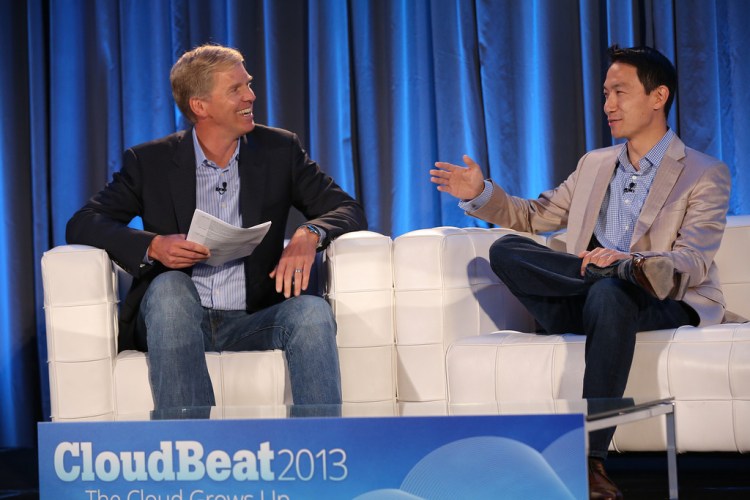SAN FRANCISCO — George Hu started his career at Salesforce.com as an intern. He’s risen steadily through the ranks, and he’s now the company’s chief operating officer.
Salesforce’s self-described “most successful intern ever” doesn’t make many public appearances, which is a bit of a shame. But he spoke Monday at CloudBeat, interviewed by early Salesforce investor Gordon Ritter, the founder at Emergence Capital.
Hu offered a fascinating and rare glimpse into life inside the Salesforce office in its early days. Many startups underestimate the importance of company culture, but Hu believes it’s imperative. He credits culture as one of the key reasons that Salesforce was able to succeed as many other startups failed.
“We were thinking through the culture from day one,” said Hu.
When he was an intern, Hu described how he pitched an idea for a new product to chief executive Marc Benioff and a few other members of the management team. By the time he joined the company full-time, that product (Salesforce’s first small business-focused offering) was fully developed. Hu was assigned the task of launching it to the market, which was his first opportunity to show off his leadership skills.
He described the Salesforce culture as transparent and “intentional.” For instance, the management team were even involved with the design of the office space, including the selection of the paint colors for the walls.
Today, Salesforce is a massive corporation with thousands of employees. But Hu claims that this culture of openness has survived, in part due to the new collaboration and cloud technology tools. Some of these tools were developed by Salesforce.com.
Management meetings are live streamed to the entire workforce in various offices around the world. Hu keeps a close eye on Chatter (Salesforce’s equivalent to Yammer) to track conversations between employees. He told me that trust is the No. 1 company value, and that failure is accepted, encouraged even. “I personally have failed at a lot of things,” he admitted.
“The company is flat,” he insisted. That’s in our cultural DNA.”
What’s next for Salesforce.com?
Hu hinted at some new products from Salesforce, which company will unveil at its upcoming Dreamforce conference.
One of the key areas of focus for Salesforce is integration. “We are thinking about it,” he said without divulging specifics, and added that we’re still in the “early innings” for this technology.
Another opportunity is cloud technology for specific verticals, like financial services or health care. These industries have a unique set of regulatory challenges, and vastly different technology problems. For instance, a leading hospital will require cloud technology that is HIPAA compliant, and doctors need the tools to store and share sensitive information.
Related: Salesforce’s director of product and health strategy spoke at HealthBeat earlier this year. He spoke to the challenges of pitching CIO’s at hospitals.
Likewise, Ritter strongly believes that having an industry-specific focus is key. In fact, that’s the investment thesis for his firm, Emergence Capital.
“It’s a huge opportunity for entrepreneurs,” said Hu, voicing his agreement. In sectors like financial services, Hu and Ritter discussed on stage how a vast “white space” exists for cloud companies to fill with innovate new products.
Salesforce has adopted a bit of a horizontal approach in the past, and broadly caters to industries across every vertical. But Hu said the company will partner with more targeted cloud players in the near future. Salesforce will continue to conquer industries “through our partners,” he said.


